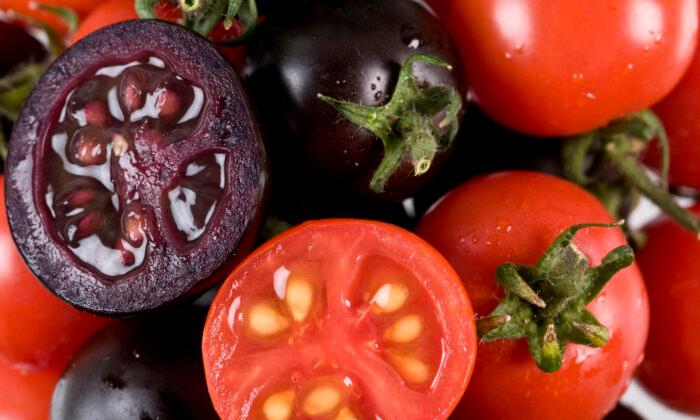A new tomato, genetically engineered to produce very high levels of the cancer-fighting antioxidant “anthocyanins”, which as a result have turned the usually red fruit into a deep purple, is set to be released in markets this year.
Anthocyanins—also found in berries—are thought to offer protection against cardiovascular disease and age-related degenerative diseases as well.
In hopes of finding ways to increase the levels of health-promoting compounds in commonly eaten fruits and vegetables, a team from the John Innes Centre, Norwich, has created purple tomatoes by integrating genes from the snapdragon flower, which is high in anthocyanins.
Tomatoes are the most consumed fruit in the world.
GMO Tomato Approved By US Department of Agriculture
The idea originated in the United Kingdom with Prof. Cathie Martin, who developed and commercialised the technology in 2008 and later started Norfolk Plant Sciences in 2022 to take it closer to a market launch.In a major breakthrough for the company, the U.S. Department of Agriculture (USDA) gave it approval in Sep. 2022 to grow and handle the purple tomato like a normal tomato.
However, it will not be available in other regions which have banned GMO products.
Pumplin, who is also Norfolk’s chief technology officer, said he wanted to change perceptions and conversations to focus more on the health potential and benefits of GMOs.
“We’ve received a lot of interest not only from liberal coastal early adopters but also from more of our agricultural centres not on the coast,” he said.
Non-GMO Tomatoes Can Naturally Produce Purple Fruit
However, the GMO purple tomatoes are up for some natural competition with an Oregon producer also working on a high antioxidant version of the fruit and “none were produced using genetically modified genes,” according to agricultural Prof. Jim Myers from Oregon State University.He said that his purple variety was bred traditionally, whereas the GMO purple tomato to be released in the U.S. market this year will not be sold in Europe, where GMO products are illegal.
Myers is also responsible for breeding a green bean variety used on 80 percent of the farmland in Oregon.

Myers has been breeding purple tomatoes for the past 11 years and recently added four other purple varieties with better flavour and yield to the mix of 50 already available in the market.
A student of Myers’s was researching how tomatoes affect human health by studying a wild species from California when he noticed a purple-ish colour that had never been characterised before. Then they began to breed a tomato that combined the health benefits of anthocyanins with the home-grown tomato.
“We made selections in the field and choose tomatoes with the most intense expression, were more resistant to decay and verticillium wilt and will last longer in the field than normal tomato fruit,” Myers said.
US Law Changed Allows GMOs to be labeled Bioengineered
Products in the United States containing genetically modified organisms (GMOs) will now be labeled as “bioengineered” under new food disclosure rules that took effect on Jan. 1, a change from being described as having “genetically engineered” or GMO components under the old rules.The countrywide standard “avoids a patchwork state-by-state system that could be confusing to consumers,” then-Agriculture Secretary Sonny Perdue said at the time.
The updated labelling requirements have drawn criticism, as well as a legal challenge from the Center for Food Safety, which claims that they’re confusing.
“These regulations are not about informing the public but rather designed to allow corporations to hide their use of genetically engineered ingredients from their customers,” Andrew Kimbrell, executive director of the centre, said in a statement. “It is a regulatory scam, which we are seeking to rescind in federal court.”
The Organic Trade Association, the Institute for Agriculture and Trade Policy, and The Non-GMO Project are among the other opponents of the rule.
“Overall, many products containing GMOs will not be labeled, meaning that the absence of a bioengineered (BE) disclosure does not mean a product is non-GMO,” the project said in a statement when the rules were unveiled.





